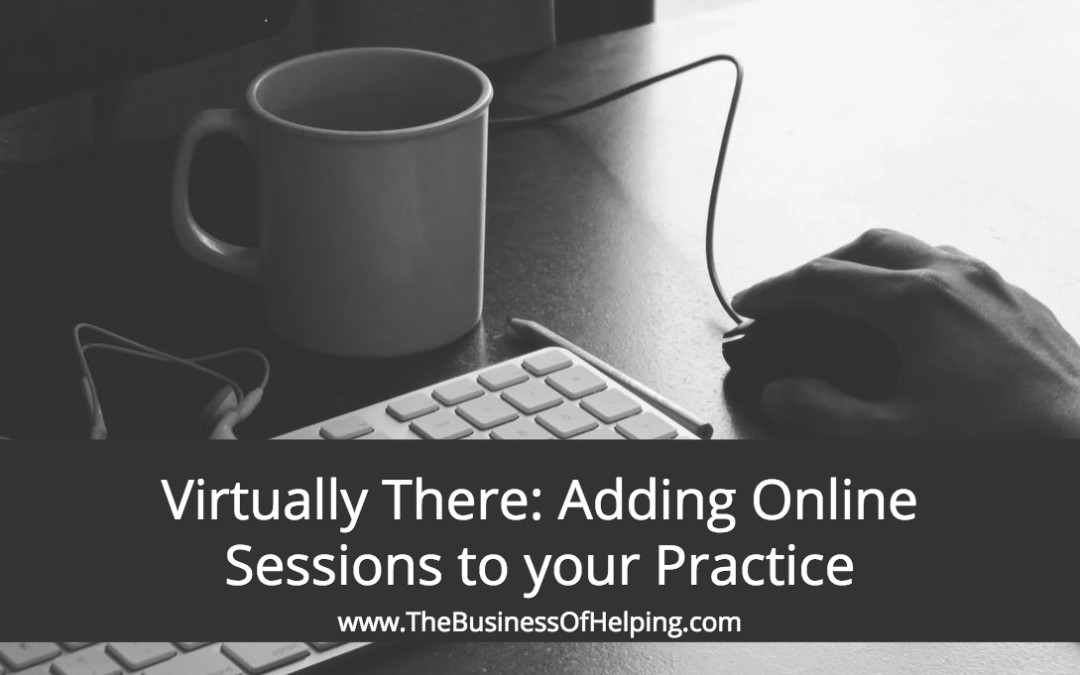Sometimes meeting face-to-face just isn’t an option (or isn’t convenient).
Whether for clients or colleagues, technology can be an incredibly convenient way to bring people together and build your business. Online virtual sessions involve the use of video chat to create a face-to-face experience when you and the other party cannot be in the same space. Those in private practice can run the gamut from not offering online sessions under any circumstances, to virtual work being the foundation of their businesses.
As with everything, the tools you use to support your work must make sense for both you as a practitioner, and for your client’s unique needs. Below are some things to consider about adding virtual sessions to your practice. There are benefits and potential concerns with using technology for therapeutic purposes. See if this service makes sense for your work.
Note: Check with your regulatory bodies and insurance providers to see if there are specific recommendations, guidelines and/or restrictions around the use of online technologies in your clinical work.
Things to consider:
• What clients would be an appropriate fit for this service, and how would you screen for this? There may be certain concerns or populations that require more than an online session could provide, or you as a clinician may need more information than could be determined without the client in the room.
• Does your therapeutic modality/style require clients to be physically present? If no, are there any circumstances where it might still make sense to offer this service?
• Is your business set up for online work? Are you set up to take payments / issue receipts if the client is not physically present? Do you have the required technology for this type of service? (computer/tablet with web camera) Is the software you are using secure?
• How will you maintain professional boundaries? Sometimes the ease of connecting online can cause therapeutic boundaries to blur. How will you account for this in your work?
• How would you handle an emergency situation if the client is not in the room? If emergency services are required, do you have the information you need to react appropriately?
Tips for doing online virtual sessions:
1) Whatever software you decide to use, create a separate account that you only use for professional purposes.
2) Make sure you get a comfortable headset and microphone. Ask your clients to do the same. This will eliminate feedback/echoes from the speakers.
3) Be in a quiet location with no background noise.
4) Have the light source in front of you as opposed to behind. If you are backlit, your face will often be difficult to distinguish.
5) If possible, plug into a hardline internet connection or have a really fast wireless connection. This helps reduce screen freezing or losing the connection midway through a session.
6) Get an alternate phone number where you can contact your client if the connection is lost and can’t be reestablished.
7) Write down the physical address for where your client is in case of emergency. This way you can still send emergency services if the client requires immediate assistance.
Pros:
• Cuts down on travel time to and from meetings/sessions for you and clients
• Low overhead – Don’t have to rent office space
• Can see clients outside of regular office hours if you choose
• Expands the reach of your practice outside of your geographical area **Make sure your insurance allows for you to practice in the area that your client is located**
• Can see the same clients even if you travel to different locations
• Allows flexibility for how/ when you work with clients
Cons:
• Sometimes can be a bit glitchy. There are times the screen can freeze, or the connection can drop if the internet connection isn’t strong. May need to have a back-up plan in case of tech problems such as a telephone session.
• Not able to assess much body language as you can only see from the shoulders up.
• You don’t have any control over the environment so there may be distractions.
• Potential costs associated with online software depending on the software you choose; some are free, others have associated fees.
• Need to educate clients on how to connect with you online.
Clients who may benefit from this service:
• New parents who cannot be away from their children for long periods of time
• Employees who cannot get more than an hour away from work
• Those who live in remote areas and cannot travel to your office
• Those who are not able to access transportation
• Those with physical mobility issues
• Those who travel for work but would like regular sessions
Virtual Sessions are one way to provide more sessions to more people, but it has to make sense for you and your work. Determine if it fits you and your style.
Do you offer online sessions in your practice? Any other tips you have to add to the list?

This was a great little article and so many helpful tips! Thanks Constance.
Thanks Julia!